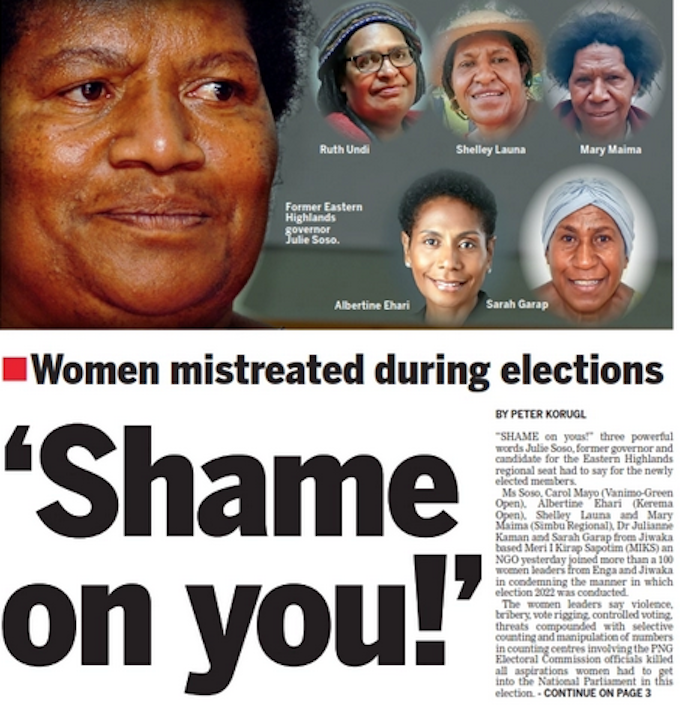
By Peter Korugl of the PNG Post-Courier
“Shame on yous!” … these are the three powerful words Julie Soso, former governor and candidate for the Eastern Highlands regional seat, had to say for the newly elected members to Papua New Guinea’s Parliament — all men so far.
Soso, Carol Mayo (Vanimo-Green Open), Albertine Ehari (Kerema Open), Shelley Launa and Mary Maima (Simbu Regional), Dr Julianne Kaman and Sarah Garap from Jiwaka-based Meri I Kirap Sapotim (MIKS), an NGO, yesterday joined more than 100 women leaders from Enga and Jiwaka in condemning the manner in which the national election 2022 was conducted.
The women leaders say violence, bribery, vote rigging, controlled voting, threats compounded with selective counting and manipulation of numbers in counting centres involving the PNG Electoral Commission officials “killed all aspirations” women had to get into the National Parliament in this election.
- READ MORE: ‘Enough is enough’: the fight to elect women to Papua New Guinea’s men-only Parliament
- Women battle for seats in PNG parliament
- Papua New Guinea hasn’t had a woman in parliament for five years. This election may deliver change
- Other PNG election reports
“Young men who are supporters of contesting candidates used violence as a means to intimidate voters at polling stations,” said Dr Kaman said from Jiwaka.
“Many women and vulnerable voters gave up and went away.”
She was supported by Launa and Maima, who said the candidates and their supporters “came to fight, not to vote”.
“They told us that the regional votes were ‘pipia votes’ [‘rubbish votes’] and they sold the ballot papers,” Launa added.
‘Hired thugs’
Not only were the women and vulnerable voters confronted with candidates and their “hired thugs” who took away the ballot papers to mark themselves as voters, they were also confronted by husbands and sons who had taken bribes.
“Campaign was good. It was at the polling booths [that the intimidation happened],” Albertine Ehari, who stood for the Kerema Open, said.
“The husbands and sons took bribes from the candidates and they took over the voting from the mothers and young girls. Many gave up.”
In the Southern Highlands, the only female candidate for regional seat, Ruth Undi, and her supporters were left wondering what had become of their votes.
“There were outside ballot papers that were brought in by the disciplinary forces and we voted.”
Undi’s campaign manager, Jamson Mange, said from Mendi yesterday: “Her supporters voted for her, they came back with their reports and we are surprised that these votes are not registered on the tally boards.”
Mayo, a candidate for the Vanimo-Green electorate, said she went up against candidates with money and cargo.
“How come I have not scored any votes? There is selective counting here, the counting was controlled and manipulated,” Mayo added.
Violence on higher scale
Violence in elections in Enga is nothing new but it was on a higher scale in this election.
“We have not voted ever since because men use force to take away the ballot boxes and mark the ballots in hideouts,” an Enga woman leader said.
The women leader is among 98 others from Porgera, Kandep, Wapenamanda, Wabag and Lagaip districts who joined 40 other women leaders from Jiwaka province, who are petitioning the PNG Electoral Commission to cancel all the writs and hold fresh elections.
The women did not want their names released because they were placing their own lives — and that of their families — in danger by taking their grievances to the PNGEC and the media.
“Declaration of candidates in the Highlands is questionable. How did they get 50.1 percent of the total votes when more than 50 percent of the voter age people did not vote?” the head of MIKS non-government group, Garap, asked.
“Candidates there did not come through free, fair, participatory, non-violent elections.”
Soso remarked: “These were promoted and accepted by leaders that are now getting ready to go into government and Parliament.
Exploiting the system
“They knew the election system was poor, they knew they would use the system to get in.
“They should be ashamed of themselves,” Soso added.
The women have demanded immediate steps to be taken to make the 2027 national election safe and free for them.
Among measures proposed include a biometric system to carry out the Common Roll, the National Identification Project, and to conduct polling in the 2027 election.
Ehari said: “Elections shouldn’t be about how much money candidates or parties are spending during or before the vote.
“It should be about people working together to choose the right leader and work together to bring practical and agreed development.”
- Papua New Guinea is one of just four countries in the world without a single woman in Parliament. The 167 women who contested this year’s elections represented less than 5 percent of the total number of candidates.
Peter Korugl is a PNG Post-Courier reporter. Republished with permission.










































